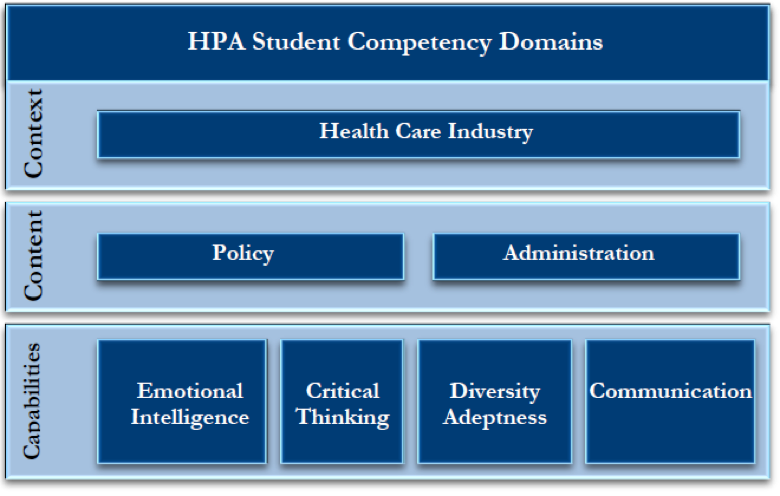Program Goals and Student Competencies
The health care field is changing. There is a growing consensus that addressing the significant problems in health care quality, health disparities, and excess costs requires health care professionals to possess a new set of competencies. Proficiency is needed to redesign, operate, and continuously improve systems of care that reliably provide high quality, efficient, and person-centered care and population-based interventions.
What does it mean to be competent? The United States Department of Labor defines workforce competency as the capability to apply or use a set of related knowledge, skills, and abilities required to successfully perform critical work functions or tasks in a defined work setting. To prepare its graduates to perform competently in the health care industry, the Health Policy and Administration faculty have designed a competency framework (Figure 1) to measure student performance in seven domains.

Figure 1: Bachelor of Science in Health Policy and Administration Competency Domains
The seven domains in the HPA Competency Framework aim at providing students with grounding in the Context of the health care industry, training in Content that is highly relevant to the health policy and administration profession, and opportunities to develop the personal Capabilities that enable effective health care occupational performance. The following describes the primary program goals for Context, Content, and Capabilities and the specific competency domains in each.
Context Program Goal
HPA graduates will possess in depth understanding of health and health care, including the structures, policies, processes and institutions that make up the U.S. health care system.
Student Competencies
HPA student competency in health industry will be evaluated by their ability to:
- Describe the main characteristics, components, and issues of the organization and delivery of health care in the United States.
- Describe public and private sources used to finance health care and reimburse for health care services.
- Analyze economic incentives and decisions related to health care organizations and the health care system.
- Assess the impact of determinants on population health, health status, and health disparities.
Content Program Goal
HPA graduates will possess the knowledge and skills necessary for organizing and directing resources towards the achievement of organizational objectives.
Student Competencies
HPA student competency in health care management will be evaluated by their ability to:
- Understand and explain financial and accounting information NCHL[1]
- Understand the alignment of human resource practices and processes to meet organizational objectives. NCHL
- Understand and use statistical and financial methods and metrics to set goals and measure organizational performance. NCHL
- Analyze implications and conclusions in light of the business, economic, demographic, ethno‐cultural, political, and regulatory trends and developments, and to use these insights to develop an evolving organizational vision. NCHL
HPA graduates will possess the knowledge and skills necessary to analyze, synthesize, and evaluate public policy.
Student Competencies
HPA student competency in health policy will be evaluated by their ability to:
- Identify past and current public policies and define the various federal agencies that influence health policy in the United States.
- Explain the processes behind health care policy making, including legislation, rulemaking and regulations, and implementation.
- Explain a social issue or policy problem by breaking it into smaller pieces or tracing its implications in a systematic way. NCHL
- Identify and analyze problems, potential solutions and best practices in order to determine appropriate courses of action.
Capabilities Program Goal
HPA graduates will possess an awareness of and the ability to manage ones own emotions in a way that enables positive interpersonal interactions and the building of productive relationships.
Student Competencies
HPA student competency in emotional intelligence will be evaluated by their ability to:
- Demonstrate awareness of one’s personal characteristics and capabilities and how others perceive these.
- Accurately hear and understand the unspoken or partly expressed thoughts, feelings, and concerns of others. ’ NCHL
- To establish, build, and sustain professional contacts for the purpose of building networks of people with similar goals and that support similar interests NCHL
- Work cooperatively with others as part of a team or group, including demonstrating positive attitudes about the team, its members, and its ability to successfully plan and execute group work. NCHL
HPA graduates will recognize the value of diversity and possess sensitivity to underrepresented and underserved groups in health care.
Student Competencies
HPA student competency in diversity will be evaluated by their ability to:
- Demonstrate insight into own prejudices and biases whether emotional, cultural, social, generational, gender based, racial or religious.
- Understand how characteristics of diversity influence health beliefs, family dynamics, communication patterns, and social values.
- Align one’s own and the organization’s priorities with the needs and values of the community, including its cultural and ethnocentric values and to move health forward in line with population‐based wellness needs and national health agenda. NCHL
- Compare and contrast the U.S. health care system with those in other developed countries.
HPA graduates will be able to interpret, analyze, and evaluate information to identify, examine, and solve problems that occur in the health care system.
Student Competencies
HPA student competency in critical thinking will be evaluated by their ability to:
- Comprehend and express the meaning or significance of a wide variety of experiences, situations, data, events, judgments, conventions, beliefs, rules, procedures or criteria.
- Correctly interpret substantive results of statistical analyses in health care management and health policy studies.
- Compare the strengths and weaknesses of alternative interpretations and judge whether an argument’s conclusions follows either with certainty and/or determine if additional information is necessary to strengthen an argument.
HPA graduates will be able to effectively receive, process, and relay information through speaking, writing, and listening.
Student Competencies
HPA student competency in communication will be evaluated by their ability to:
- Prepare written documents using correct grammar, punctuation, style, and spelling that convey information and/or opinions in a clear and compelling manner.
- Prepare and deliver logical, concise, persuasive oral presentations that convey information and/or opinions in a clear and compelling manner.
- Use appropriate nonverbal communication (eye contact, gestures, posture) when communicating with others.
- Communicate effectively with individuals from a variety of socio-economic and cultural backgrounds.
- Use professional terminology correctly and appropriately.
- Demonstrate active listening and engagement skills in order to understand the approach, views, and what is important to others.
[1] NCHL: Denotes a competency derived from and defined based on the National Center for Healthcare Leadership’s competency model. Retrieved from nchl.org/Documents/NavLink/Competency_Model-summary_uid31020101024281.pdf on May 16, 2016.



